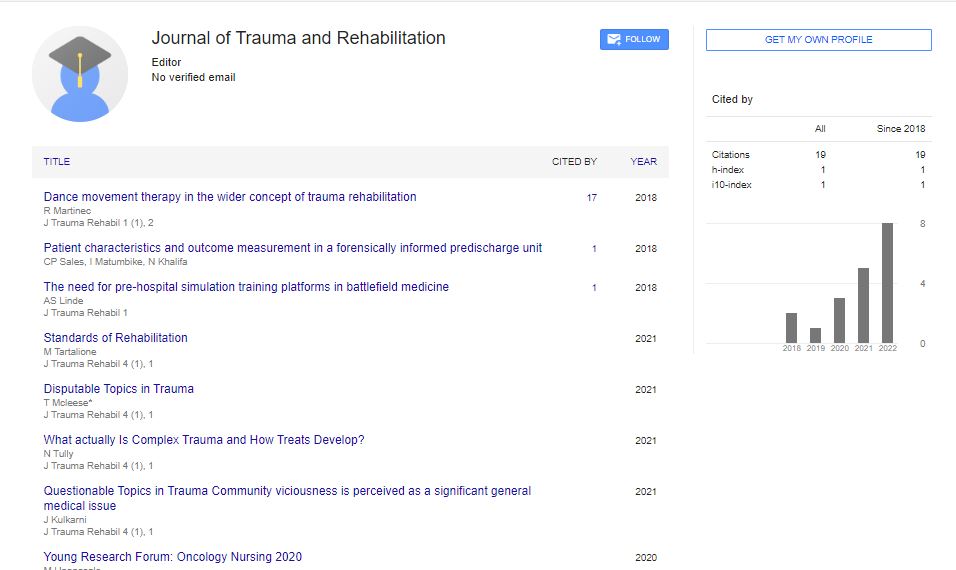Perspective, J Trauma Rehabil Vol: 6 Issue: 3
Assessing the Impact of Psychological Trauma on Human Health
Coel Jennie*
1Department of Psychology, Stellenbosch University, Stellenbosch, South Africa
*Corresponding Author: Coel Jennie,
Department of Psychology, Stellenbosch
University, Stellenbosch, South Africa
E-mail: coel_jennie@su11.gmail.com
Received date: 23 August, 2023, Manuscript No. JTR-23-118510;
Editor assigned date: 25 August, 2023, PreQC No. JTR-23-118510 (PQ);
Reviewed date: 08 September, 2023, QC No. JTR-23-118510;
Revised date: 15 September, 2023, Manuscript No. JTR-23-118510 (R);
Published date: 22 September, 2023, DOI: 10.4172/Jtr.1000134
Citation: Jennie C (2023) Assessing the Impact of Psychological Trauma on Human Health. J Trauma Rehabil 6:3.
Description
Psychological trauma is an insidious adversary, often invisible to the naked eye, but its effects can be profound and enduring. Experiences of trauma can result from a range of events, including accidents, natural disasters, abuse, and combat, leaving individuals grappling with psychological wounds that can significantly impact their overall health and well-being. Psychological trauma is a complex and broad term, encompassing a wide range of distressing experiences that can have long-lasting repercussions. Resulting from accidents, injuries, or medical procedures.
Stemming from distressing events like abuse, neglect, or loss. Arising from adverse childhood experiences that disrupt healthy emotional and psychological development. Emerging from damaged or toxic relationships, including domestic violence or intimate partner abuse. Occurring in military personnel exposed to the horrors of war. Psychological trauma is strongly associated with a higher risk of developing mental health disorders, including Post-Traumatic Stress Disorder (PTSD), depression, anxiety, and substance use disorders. The emotional scars of trauma can be debilitating and require specialised treatment.
Trauma does not spare the body. Individuals who have experienced trauma are more susceptible to physical health issues such as chronic pain, heart disease, gastrointestinal problems, and autoimmune disorders. The body's stress response system is often dysregulated in those who have endured trauma. A substantial number of individuals turn to drugs or alcohol as a way to self-medicate and cope with the emotional pain stemming from trauma. Substance abuse can worsen both physical and mental health problems.
Psychological trauma can weaken the immune system, making individuals more vulnerable to infections and illnesses. This has profound implications for overall health. Sleep disturbances are common among trauma survivors. Chronic insomnia can lead to a cascade of health problems, including mood disorders and cognitive impairments. The cardiovascular system may suffer from the traumainduced chronic stress response. Trauma survivors are at increased risk of hypertension, heart disease, and strokes.
Trauma can strain interpersonal relationships, as those affected may struggle with emotional regulation, trust issues, and difficulty connecting with others. Trauma can lead to cognitive impairments, affecting memory, attention, and decision-making abilities. This can impact an individual's ability to function in daily life.
Treatment and recovery
Recognising the profound impact of psychological trauma on human health underscores the importance of early intervention and support. Several approaches can help survivors on their path to recovery. Evidence-based therapies such as Cognitive-Behavioral Therapy (CBT), Eye Movement Desensitisation and Reprocessing (EMDR), and Dialectical Behaviour Therapy (DBT) can be effective in treating trauma-related disorders.
In some cases, medication can help manage symptoms of depression, anxiety, and PTSD. However, it should be used in conjunction with therapy for the best outcomes. Connecting with support groups and networks can provide a sense of belonging and understanding that is essential for healing. Practicing self-care techniques such as mindfulness, yoga, and exercise can help trauma survivors manage stress and improve their overall health. Complementary therapies like art therapy, meditation, and acupuncture have also shown promise in helping individuals heal from trauma.
Preventing psychological trauma is a societal responsibility. Education, awareness, and early intervention can reduce the incidence and severity of trauma. This includes addressing child abuse and domestic violence, and promoting mental health and resilience in individuals and communities.
Conclusion
The impact of psychological trauma on human health is profound and multifaceted, affecting not only mental well-being but also physical health, relationships, and overall quality of life. Recognising the signs and symptoms of trauma, providing timely intervention, and supporting survivors in their journey to recovery is essential. Moreover, fostering awareness and developing a culture of prevention can help reduce the incidence of trauma, minimising its far-reaching effects on human health and well-being.
 Spanish
Spanish  Chinese
Chinese  Russian
Russian  German
German  French
French  Japanese
Japanese  Portuguese
Portuguese  Hindi
Hindi 